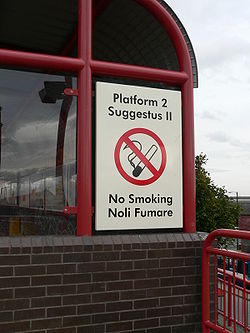
Latin lives on in the form of Ecclesiastical Latin used for edicts and papal bulls issued by the Catholic Church, and in the form of a sparse sprinkling of scientific or social articles written in it, as well as in numerous Latin clubs. Latin vocabulary is used in science, academia, and law. Classical Latin is taught in many schools often combined with Greek in the study of Classics, though its role has diminished since the early 20th century. The Latin alphabet, together with its modern variants such as the English, Spanish and French alphabets, is the most widely used alphabet in the world. Terminology deriving from Latin words and concepts is widely used, among other fields, in philosophy, medicine, biology, and law, in terms and abbreviations such as subpoena duces tecum, q.i.d. (quater in die: "four times a day"), and inter alia (among other things). These Latin terms are used in isolation, as technical terms. In scientific names for organisms, Latin is typically the language of choice, followed by Greek.
The largest organization that still uses Latin in official and quasi-official contexts is the Roman Catholic Church (particularly in the Latin Rite). Although the Mass of Paul VI is usually said in the local vernacular language, it can be and often is said in Latin, particularly in the Vatican. Indeed, Latin is still the official standard language of the Roman Rite of the Catholic Church, and the Second Vatican Council merely authorized that the liturgical books be translated and optionally used in the vernacular languages. Latin is the official language of the Holy See and the Vatican City-State. The Vatican City is also home to the only ATM where instructions are given in Latin.[11].
Some films of relevant ancient settings, such as Sebastiane and The Passion of the Christ, have been made with dialogue in Latin for purposes of realism. Occasionally, Latin dialogues are used because of its association with religion or philosophy, in such film/TV series as the Exorcist and Lost (Jughead). Subtitles are usually employed for the benefit of audiences who do not understand Latin. There are also songs written with Latin lyrics.
Many organizations today have Latin mottos, such as "Semper Paratus" (always ready), the motto of the United States Coast Guard, and "Semper fidelis" (always faithful), the motto of the United States Marine Corps. Several of the states of the United States also have Latin mottos, such as "Montani Semper Liberi" (Mountaineers are always free), the state motto of West Virginia, and "Esse Quam Videri" (To be rather than to seem), that of North Carolina.
Latin grammar has been taught in most Italian schools since the 18th century: for example, in the Liceo classico and Liceo scientifico, Latin is still one of the primary subjects. Latin is taught in many schools and universities around the world as well.
Instruction in Latin

The Living Latin movement attempts to teach Latin in the same way that modern living languages are taught, i.e., as a means of both spoken and written communication. Living Latin instruction is provided at the Vatican, and at some institutions in the U.S., such as the University of Kentucky. In the United Kingdom, the Classical Association encourages this approach, and Latin language books describing the adventures of a mouse called Minimus have been published. In the United States, the National Junior Classical League (with more than 50,000 members) encourages high school students to pursue the study of Latin, and the National Senior Classical League encourages college students to continue their studies of the language.
Many international auxiliary languages have been heavily influenced by Latin. Interlingua, which lays claim to a sizeable following, is sometimes considered a simplified, modern version of the language. Latino sine Flexione, popular in the early 20th century, is a language created from Latin with its inflections dropped.
Latin translations of modern literature such as Treasure Island, Robinson Crusoe, Paddington Bear, Winnie the Pooh, Olivia, Tintin, Asterix, Harry Potter, Le Petit Prince, Max und Moritz, How the Grinch Stole Christmas, and The Cat in the Hat are intended to bolster interest in the language.

No comments:
Post a Comment